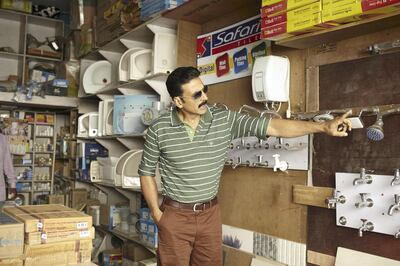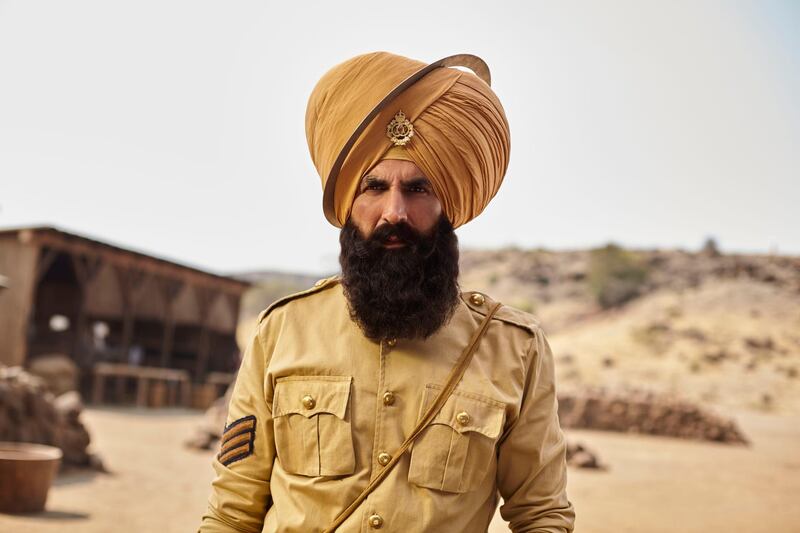For an actor who has claimed repeatedly that he hates being stereotyped and that tags "suffocate him", Bollywood star Akshay Kumar's 30-year career can be split into three broad phases: the fit-as-a-fiddle action hero of the 1990s; the charming, loveable and comical goof of the 2000s; and in the last five years, he has been the poster boy for Indian patriotism.
Since 2014, the 51-year-old actor has starred in 11 films with nationalistic flavour. Fierce national pride has also been central to the plot of eight out of his past 10 films, so much so that it is sometimes difficult to distinguish one Kumar film from another.
His last two Bollywood releases, Kesari (2019) and Gold (2018), are set in pre-independence India, with the actor playing the nationalist who brings honour to his country and people by triumphing against the odds. The settings are starkly different, Kesari is staged on the battlefield, while Gold was a historical sports drama, but Kumar's characters in both films followed a similar trajectory: achieving the impossible due to the sheer force of will and asserting India's superiority in the face of foreign invaders.
There was Naam Shabana and Jolly LLB 2 in 2017; Rustom and Airlift in 2016; Gabbar is Back and Baby in 2015; and Holiday in 2014, films in which Kumar plays some variation of the son of the soil.
Kumar might be its latest torch-bearer, but patriotism has a box-office appeal that spans many decades. From Manoj Kumar in the 1960s, 1970s and 1980s to Sunny Deol in the 1990s and early 2000s, Kumar is following a tradition of actors who have kept India's flag flying high. While Manoj Kumar is the undisputed king of film patriotism, from Upkar in 1967 to Clerk in 1989, Deol capitalised on the patriotic fervour inspired by insurgency in Kashmir in the 1990s.
Going the patriotic route has helped Kumar gain recognition.
A history of being a national hero
His films have often been slammed by critics for their poor production quality and under-developed scripts that lean so heavily on propagating a social message that they forget that movies are, first and foremost, an art form, not government advertisements taken out in public interest. Toilet: Ek Prem Katha, in particular, received a lot of flak for its unabashed and proud glorification of the Indian government's flagship Swachh Bharat mission. And yet, it was among the top-grossing Bollywood films of 2017.

A year before that Kumar starred in Rustom, which was widely ridiculed as a tackily shot and overly dramatised patriotic film that couldn't even get the uniform of its lead actor, a naval officer, correct. Even though critics called Rustom one of Kumar's worst performances in recent years, it won him his first Best Actor National Film Award. It was a move that raised many eyebrows and was hotly debated as a sign of political interference in the jury's decision-making.
Becoming the poster boy for nationalism and stoking patriotic fires has major financial benefits in a country that sells an estimated 2.2 billion tickets and produces over a 1,000 films annually, more than double the amount that Hollywood churns out. If it’s done in a way that sheds a favourable light on the sitting government, so much the better.
What he's gained from his roles
Kumar claims that he has no particular affinity for films with a country-loving flavour, but his role as Bollywood's resident patriot is so well-entrenched in the minds of his audiences that it reflects in his brand endorsements too. One advertisement for an edible oil company has him cooking for soldiers in the army, while the most on-the-nose of the lot has Kumar peddling a particular brand of tiles with the dialogue:"Desh ki mitti se bani tiles se desh ko banate hain (Let's build the country with tiles made of the country's soil)", spoken while dressed as an army officer.
Kumar's standing as the foremost patriotic icon of today's generation cannot be denied. And yet, his success has to be viewed with a hint of irony given that, while his public persona rests on his perception as a devoted, nation-loving Bollywood superstar, in reality, Kumar gave up his Indian citizenship in favour of Canada many years ago.
He might not be as much of the son of the soil as his social media and marketing machines will have us believe, but for as long as he has us lapping up every word of his nationalist scripts, he's going to be laughing all the way to the (Canadian) bank.










